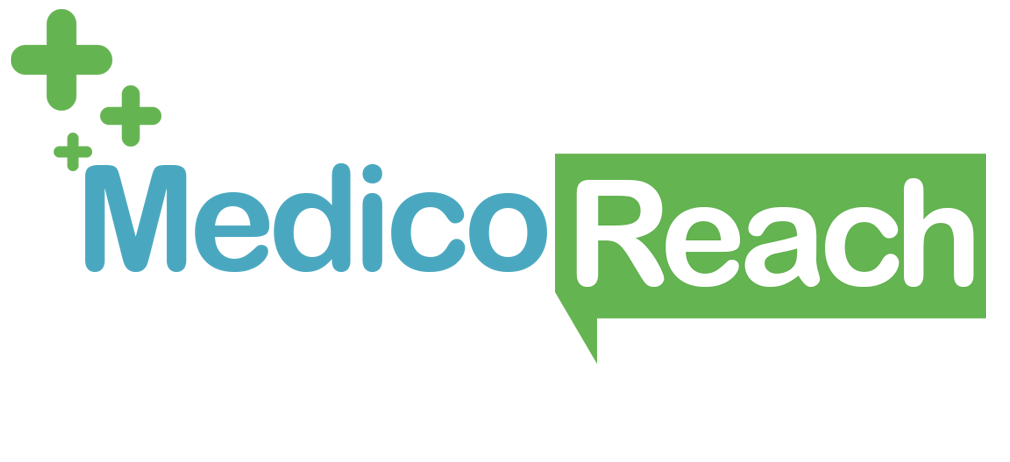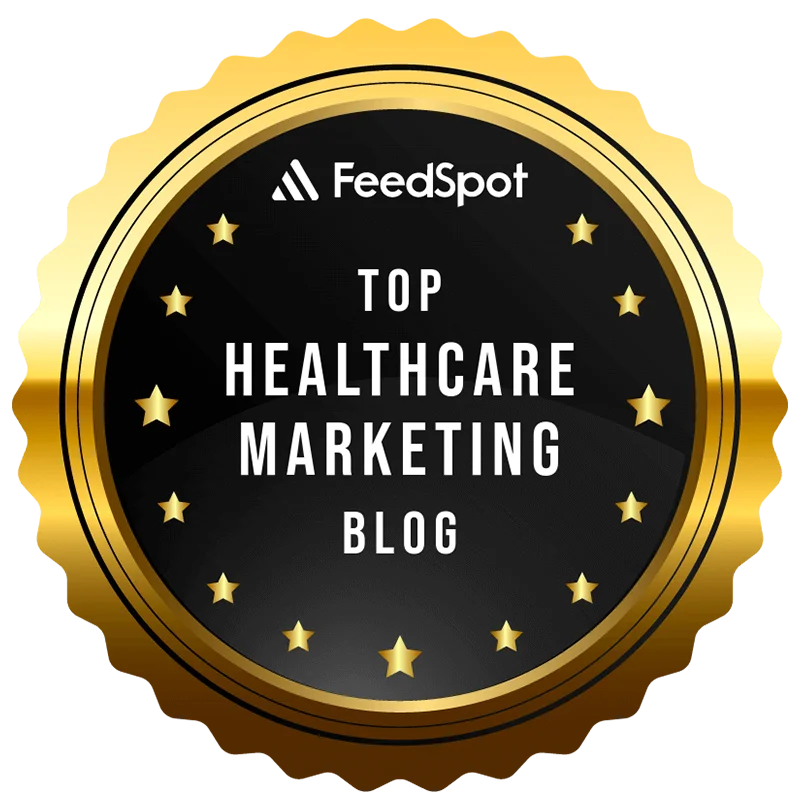The oncology industry trends are undergoing an unprecedented transformation, driven by the rising incidence of cancer and technological advancements. This growth is leading the global oncology market to a projected valuation of USD 903.81 billion, with a CAGR of 10.9% by the year 2034. Pharmaceutical executives, biotech innovators, policymakers, and healthcare marketers are among the few professionals who contribute extensively to the oncology industry. Hence, it is only obvious for these professionals to learn about the latest oncology market trends, including rising investments in precision medicine, growing demand for immunotherapy, and the increasing adoption of AI-driven diagnostics and Big Data analytics in cancer care.
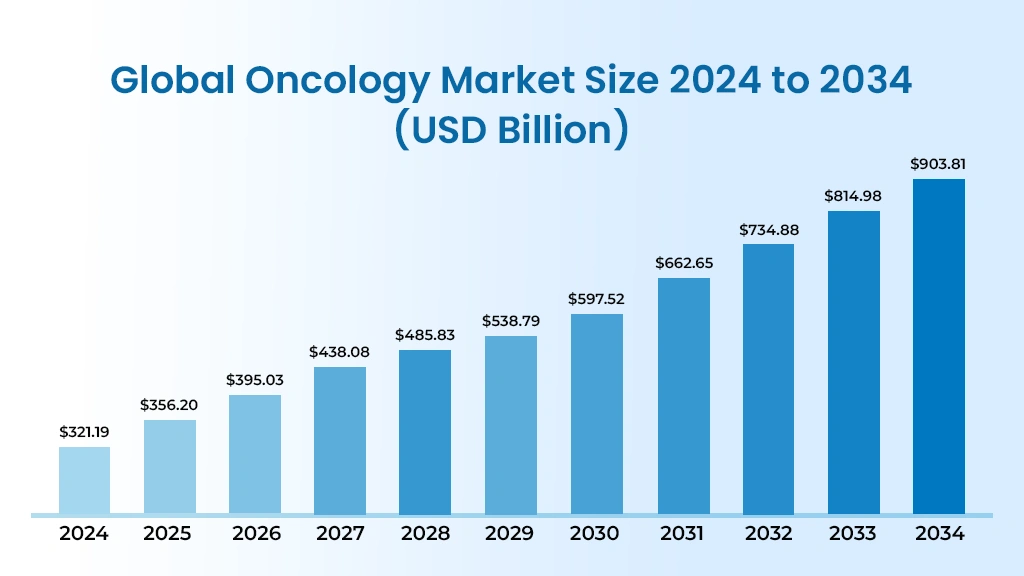
Oncology Market Trends: Growth, Technology, and Industry Momentum
- The importance of AI in the oncology market is expected to contribute to the market growth from USD 2.4 billion in 2025 to USD 9.1 billion in 2035.
- The global oncology medical spend is estimated to reach a valuation of $409 billion by the year 2028. This is precisely why massive investment inflows are occurring in the development of oncology medicine. Oncology therapeutics account for approximately 20% of global pharmaceutical sales. Following AI-enabled cancer care solutions, immunotherapies, and biosimilars, these developments are also a testament to the momentum and potential of the oncology industry.
- North America is leading the market with the largest share, generating 43% of global oncology revenue due to the high incidence of cancer. However, it is also leading to the development of the most advanced healthcare infrastructure and substantial R&D investment. For instance, North America holds the largest revenue share in the global AI diagnostic market. In recent years, it accounted for 4% of the contribution.
- The major oncology players driving innovations are Bristol-Myers Squibb, Roche, Novartis, Merck, Pfizer, and emerging biotech firms focused on immunotherapies, AI applications, and precision medicine.
Transforming Oncology: AI and Big Data
Cancer is a healthcare challenge that has, in recent times, claimed 10 million lives. However, oncology market trends such as artificial intelligence (AI) and Big Data are now at the forefront of cancer detection, research, and treatment. The combination of these technologies is driving unprecedented innovation in the oncology market, offering healthcare professionals, pharmaceutical executives, policymakers, biotech innovators, and researcher’s new pathways to operational efficiency and improved patient outcomes.
Market Growth Driven by AI and Big Data Introduction:
The global AI market is experiencing explosive growth, with an estimated valuation of USD 39.89 Trillion by 2034, driven by a compound annual growth rate of 32.40%. This growth is fueled by increasing cancer prevalence, which escalates the demand for precision medicine, the expansion of healthcare IT infrastructure, and substantial investment from both public and private sectors. If you are a key stakeholder, your decisions and actions will play a crucial role in shaping the future of this market.
As mentioned earlier, North America currently dominates the market, buoyed by advanced healthcare systems, the widespread adoption of AI oncology solutions, and significant research and development efforts. However, the Asia-Pacific region is rapidly emerging as a key player, driven by a surge in cancer incidences due to the expanding geriatric population, lifestyle changes, and enhanced digital care initiatives in India, China, and Japan. This region has significant potential to become a major player in the AI-driven healthcare market.
Application of Artificial Intelligence in Oncology:
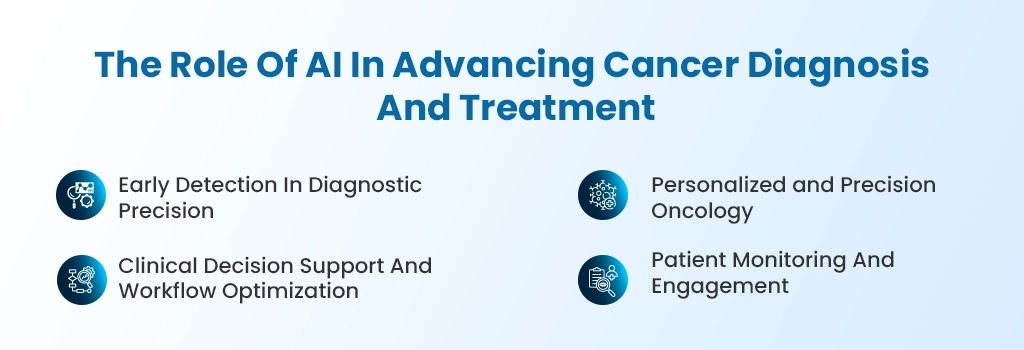
- Early Detection in Diagnostic Precision:
AI-enabled tools put to use advanced deep learning and machine learning algorithms to study vast datasets of pathology slides, genetic information, and medical imaging. These tools contribute to improving diagnostic accuracy, speed, and reliability. Reducing human error and leading to faster cancer detection.
Example: AI enhances diagnostic precision among breast cancer physicians for HER2 (Human Epidermal Growth Factor Receptor 2) scoring, reducing misclassification by 65%. Overall, this results in more targeted treatment and therapy.
- Personalized and Precision Oncology:
Transitioning from generalized cancer treatment to precision oncology treatment is heavily dependent upon AI’s ability to analyze multi-omics data (genomic, proteomic, and clinical patient data). It tailors a treatment plan specific to the tumour biology of the patient. AI also assists oncology in predicting therapeutic responses, optimizing targeted therapies, and eventually leading to better treatment outcomes.
- Clinical Decision Support and Workflow Optimization:
An AI-driven clinical decision support system is perfect for healthcare professionals to integrate complex data into actionable insights, thereby improving care coordination and treatment plans. For example, AI-based image analysis and digital pathology platforms streamline workflows in the pathology and radiology departments. Enhancing diagnostic turnaround time.
- Medicine Discovery and Development:
AI is also improving medicine discovery through predictive modelling of molecular interactions, simulation of clinical trial outcomes, and other methods. This reduces time to market oncology therapeutics and also minimizes the cost of R&D.
- Patient Monitoring and Engagement:
Innovations, including virtual assistants and AI-powered chatbots, are transforming patient care and healthcare operations. This can track patients’ adherence to medication, facilitate remote consultations, and monitor patients’ symptoms. The existence of these tools supports chronic disease management, enhances the patient experience, and, ultimately, facilitates ongoing data collection for the generation of real-world evidence, which supports research purposes.
Big Data Analytics: The Backbone of Oncology Analytics
- In the present era, the generation of a vast amount of oncology data through electronic health records, genomic sequencing, medical imaging, and clinical trials has made the existence of a big data analytics framework more crucial than ever. AI relies on these rich databases to train sophisticated algorithms and enable actionable insights, making big data analytics the backbone of oncology trends.
- Importantly, big data’s federated learning models are a key contributor to enabling AI to learn from distributed datasets across institutions while preserving patient privacy and ensuring regulatory compliance.
- Big Data plays a crucial role in enhancing clinical trials, refining market access strategies, and identifying unmet business needs for healthcare companies. It supports predictive analytics for oncology and population health management, enabling policymakers to understand resource allocation requirements and cancer epidemiology.
Challenges and Considerations for Adoptions of Big Data and AI
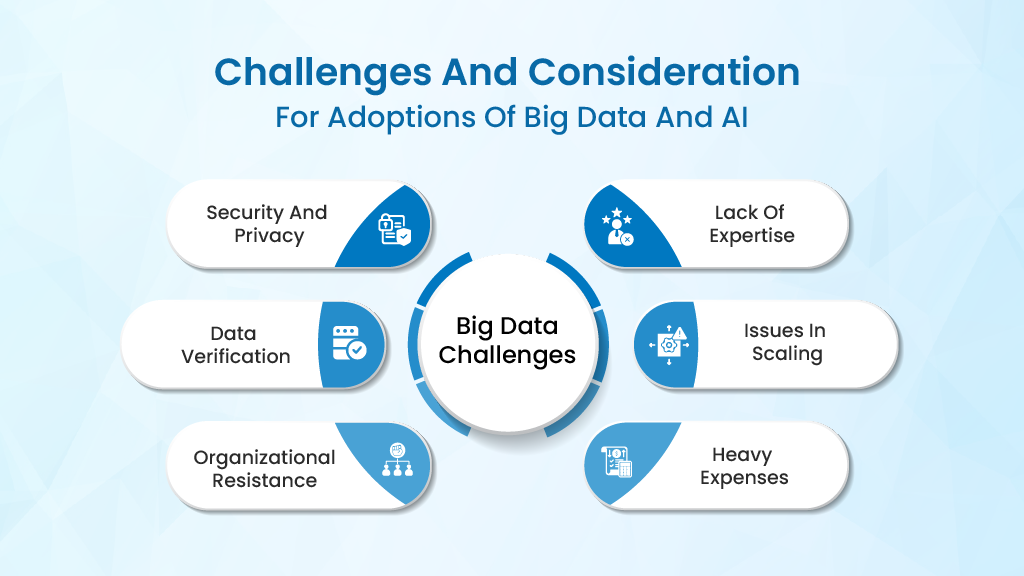
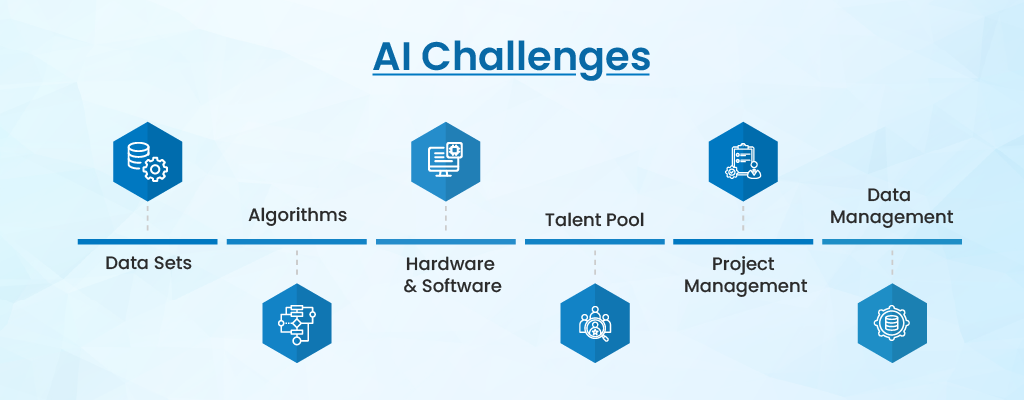 AI holds significant promise in healthcare, but its adoption at scale, especially in the realm of Big Data, is not without challenges. Currently, 57% of the organization has a clear AI strategy, which presents challenges in areas such as data standardization, regulatory approval processes, legal IT systems, and clinical training. A key consideration is the necessity of explainable AI, which is essential for building clinician trust by ensuring that AI recommendations are clear, transparent, and in accordance with clinical guidelines.
AI holds significant promise in healthcare, but its adoption at scale, especially in the realm of Big Data, is not without challenges. Currently, 57% of the organization has a clear AI strategy, which presents challenges in areas such as data standardization, regulatory approval processes, legal IT systems, and clinical training. A key consideration is the necessity of explainable AI, which is essential for building clinician trust by ensuring that AI recommendations are clear, transparent, and in accordance with clinical guidelines.
Regulatory requirements, such as HIPAA in the United States and the GDPR in the European Union, mandate that oncology AI solutions comply with cybersecurity protocols and adhere to ethical standards. These requirements can be effectively managed by fostering strategic partnerships among healthcare providers, AI developers, and regulators involved in the process.
Market Opportunities & Strategic Insights for B2B Stakeholders:
Given that the oncology market is highly competitive and complex, it is continuously driven by evolving treatment paradigms and rapid scientific advances. We have listed here a few market opportunities for specific industry sectors that incorporate new market trends in oncology, including AI and Big Data.
- Pharmaceutical and Biotech Companies:
Partnering with AI vendors and utilizing AI-driven drug development makes the entry into the medicine market feasible and accelerates pipeline progression. Additionally, AI-generated real-world evidence will strengthen regulatory submissions.
- Investor and Venture Capitalists:
Investors and venture capitalists, take note: the oncology AI market is ripe with investment opportunities. From startups specializing in cancer diagnostics to those developing remote patient management tools and therapeutic prediction algorithms, the potential for growth is substantial. With the global oncology market projected to grow at a CAGR of 25%, particularly in regions with increasing health digitization, the time to invest is now.
- Researchers and Academics:
For researchers and academics, the future of oncology lies in collaborations that combine AI methodologies and data science. These partnerships are not only beneficial but also essential. By fostering federated learning models, open data sharing, and explainable AI, we can pave the way for breakthroughs in therapy optimization and cancer biology.
- Policy Makers and Regulators:
Fostering an innovation ecosystem, clarifying AI regulatory pathways, and supporting digital health infrastructure are crucial steps for accelerating AI adoption while ensuring patient safety and security. Moving forward, it is essential to heavily focus on this area, as this industry sector is expected to generate 10 times the revenue in the coming decade.
- Healthcare Providers:
Big data and AI providers offer significant opportunities to enhance diagnostic accuracy and improve patient satisfaction. Investments in AI-assisted imaging infrastructure and digital pathology are pivotal for modern oncology centers, providing a competitive advantage and delivering value-based care.
Future Outlook on Oncology Trends: Building a Data-Driven Ecosystem
Powered by Big Data and AI, oncology is supposed to become even more predictive, personalized, preventative, and participatory.
- The potential of AI in integrating pathology, radiology, clinical data, and genomics is immense, promising a comprehensive approach to diagnosis and enhancing diagnostic precision.
- Further advancements in AI-enhanced molecular diagnostics and liquid biopsies are set to revolutionize cancer detection, offering a less invasive and more reassuring path for patients and researchers alike.
- Investments in patient engagement technology and workflow automation are not just futuristic; they are set to transform the very delivery of cancer care, inspiring the industry with their potential.
Conclusion
Beyond the insights shared in this blog about oncology market trends, establishing contact with oncologists allows healthcare professionals and industry stakeholders to gain first-hand perspectives on emerging cancer treatments, as well as the expanding role of innovative immunotherapies and AI-driven diagnostics in shaping the future of patient care. The use of big data and AI in healthcare industry is increasingly helping professionals curate personalized treatment plans. This not only enhances patient outcomes but also creates opportunities for the healthcare sector, biotech, and pharmaceutical industries, among others.
Therefore, it is not only essential but also a responsibility for all stakeholders in the industry to continuously update themselves on the ongoing and future market trends in oncology. This is the only way to drive innovation and deliver more targeted and effective cancer therapies in a rapidly evolving oncology landscape.
